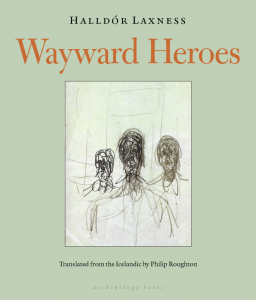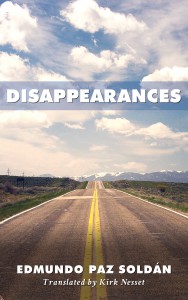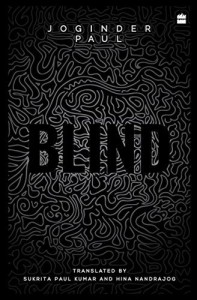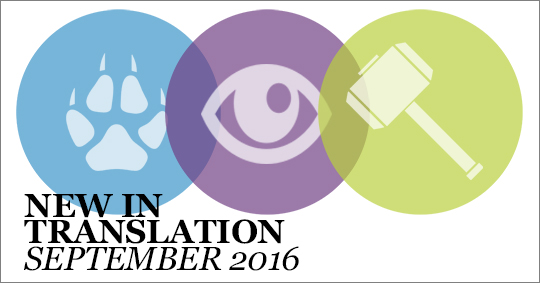
Wayward Heroes, by Halldór Laxness, tr. Philip Roughton. Archipelago Books.
Review: Beau Lowenstern, Editor-at-large, Australia
The process of reading literature in translation is to dip into the perennial pool: possible meanings are compounded by language, we splash and struggle and only when we begin to get on our feet do we realise how much deeper and longer the cave goes. Often great writers see only a tiny fraction of their oeuvre translated for a wider audience—as a reader, we must play a game of guessing the size and shape and clarity of the submerged iceberg from only its superficial crown. Not to mention the person we all know who constantly admonishes us that if we had only read the original…
Iceland’s Halldór Laxness falls into this lamentable category, with the majority of his collection of stories, essays, novels (including a four-volume memoir), plays and poetry frozen in time to all bar those with a blue tongue. Published in Iceland in 1952 as Gerpla, The Happy Warriors was the title of the original, sparsely recognised English translation, though it contributed to his body of work for which he was awarded the Nobel Prize in Literature in 1955.
However, with help from Archipelago Press and translator Philip Roughton (of Iceland’s Bell and The Great Weaver from Kashmir), this buried translation has seen somewhat of a resurrection. Wayward Heroes is a reworking of medieval Icelandic sagas—mainly the Saga of the Sworn Brothers and Snorri Sturluson’s account of the Norwegian saint-king Olaf Haraldsson—and echoes the style and language of those works, whilst turning them on their heads.
It is a book filled with strange and terrible things: of Viking raids and senseless murder, of trolls and swan-women who soar among the clouds, of skalds and heroes and farmers and fishermen; steeped in a language that is both magical yet frank, often laden with irony. It is a testament to Roughton that much of Laxness’ magnetic complexity remains throughout the English.
The two sworn brothers, Þormóður Bessason and Þorgeir Hávarsson, strive to relive the honor and glory of days of old when heroes spoke only with their swords and skalds venerated kings of might. Instead of battles and adventures, richly glorified as they are in the sagas, the assumed heroes are instead faced with an indifferent world; one that is more concerned with the trials and joys of everyday livelihood than with illusory ideals.
As a saltmaker remarks:
“We have had plenty of kings in Norway, but the only ones that proved of any use to us were those that we sacrificed for good harvests and peace”.
Þormóður, his fate long foreshadowed, ultimately sees that his pursuits have lead only to death and destruction. Yet the book hangs on a thread between tragedy and farce and denies even its protagonists a rightful conclusion, ending the night before Þormóður falls in battle alongside his king—his poetic brilliance long faded—and Þorgeir’s life unavenged, his head decaying and forgotten in a farm storeroom.
Tense shifts between past and present—used to emphasize significant events or dramatic moments in Old Icelandic—Roughton has aptly kept, and work well to punctuate instances where knowledge of 11th-century European history or of the sagas would be beneficial.
Laxness’ satirical tone comes through most clearly in these instances, when he employs theatrical language to dramatize not the sounds of battle or the lays of great kings, but the common, often mundane interactions between peasants. His is a voice that begins softly and rises to a roar: when the great Thorkell the Tall’s Viking horde is defeated by the women, the children and the elderly, all baring “ladles, brooms and crutches” at the gates of London, and when Olaf the Stout (to become Olaf the Saint) speaks to his “invincible army” of criminals and miscreants of the glories of battle. The language is direct and powerful and subtly builds to a critical view not dissimilar to the bluster and posturing of nations Laxness witnessed in his own time of writing, following the Second World War. He peels away the mythic majesty of the sagas—and, indirectly, the worship of power and pursuits through violent means that leak into our own time.
If (and hopefully as) the tip of the literary iceberg continues to emerge, our view of Laxness will only deepen and his entire body of work will further supplement the understanding of intricate novels such as this. Wayward Heroes shows not only the mastery and depth of language one is capable of, but to what end this skill can be harnessed and brought forth without blinding.
“It could well be that the world will give you the best that it has: glory, power, honor, what else is there? Palaces and parks, perhaps? Or merry meadows? And then what?”

Disappearances by Edmundo Paz Soldán, tr. Kirk Nesset. Calypso Editions.
Review: MARGENTO, Editor-at-Large, Romania & Moldova
Disappearances by Edmundo Paz Soldán is a micro fiction page turner. One of the flash stories is simply a five-line exchange between a husband and a wife regarding buying a television, another one—again 5 sentence long—recounts how a poet thought, “ignorant and happy”—a phrase the author manages to turn into an echoic lingering refrain in spite of the draconic brevity of the piece—he was exiled because of his verse…
After a one-night stand a lady calls the number on a “humiliating thank-you note,” but she keeps getting only the answering machine, for years and years, and yet she never gives up while still wondering what happens on the other end of the call—“Maybe he moved, I tell myself, and forgot to disconnect the machine; but the idea of somebody paying to keep a phone on fifteen years in an empty apartment seems even more absurd…”—and that is what the reader does too, wonders what could have happened, and many of these micro stories have this effect, working like absurdist puzzles that wait not so much to be solved but to baffle us with the sudden realization that life could be that mercilessly senseless or inexplicable.
Other pieces make one wonder not necessarily about the possible sequence of ‘real’ events behind the screen of the speaker’s laconism, but about the reason why certain statements, events, or images appear together in the same ‘snapshot’. Or, in other words, why are we presented with this particular non sequitur? A three-sentence long piece, for instance, starts with an ample and surreal landscape, to just land then briskly on a curt note announcing the speaker’s mother’s sudden death on the same morning. What does one have to do with the other? Nothing? On second thought though, the middle sentence bridging the other two apparently conflicting ones acquires a strangely oracular sound: “It didn’t matter.” The ambiguity is poetic—the explanation perhaps doesn’t matter at all, or, in another possible reading, the lack thereof makes the world itself not matter at all in spite of its overwhelming spectacle, fascinating landscapes, or even apocalyptic catastrophes. While being remarkably original therefore, Soldán emerges from a rich Latin American tradition—the name of the insufficiently translated Álvaro Menen Desleal particularly comes to mind—which he masterfully fuses with European, mainly Kafkaesque and Brechtian ones. The translator Kirk Nesset does a good job rendering all that compressed richness (which can be tasted in facing page translation), knowing when to take liberties—and thus once in a while jazzing his version up with subtly more percussive rhythms than the original—and when to make sure the reader stays focused on the original as well (as in for instance translating an English catch phrase into… Spanish).
Not all the flash fictions are as short as the ones mentioned above though, some go on for one or two pages. In one of the most accomplished longer ones, people have to live in a regime where everything and every place—streets, public squares, cities, provinces—have been named for the leader of the country, a situation that ironically became impracticable for the foreign tourists and not for the locals who “learned quickly to differentiate between the state of General Ricardo Salvatierra and the state of General Ricardo Salvatierra.” “It wasn’t hard, in the end; you just needed to hear and have a modicum of subtlety” continues the irony shrewdly hinting at people’s inexhaustible ways of resisting dictatorships in South America and elsewhere by means of the inerasable power of the vernacular and the apparently oxymoronic subtlety of the common(er). But the irony goes much further actually—the absurd of the discretionary power and its will to make uniform everything and everybody are inevitably matched by the irrepressible memory of exactly what has been done to secure the success of the dictatorship. “The hardest part was learning to live with the name: how could we not remember, whenever we used it (and we used it continuously), through a simple chain of ideas, the Catavi and San Juan killings, concentration camps in Terebinto and Ayo Ayo? And mass deportations and censorship of the press, disappearances of any who opposed the regime? Forgetting would have been impossible. Impossible.”
The “disappearances” in the quotation above represent in fact the simultaneously pervasive and evasive theme of the book, which operates with such paradoxes, leaving a lot out and thus saying a lot more, and obsessively turning the disappeared into endlessly haunting apparitions.

Blind by Joginder Paul, tr. Sukrita Paul Kumar and Hina Nandrajog. Harper Perennial.
Review: Poorna Swami, Editor-at-Large (India)
A home for the blind is a lookout point for a view of the world—the unifying thrust of Joginder Paul’s Blind (published by Harper Perennial), translated from the Urdu Nadeed by Sukrita Paul Kumar and Hina Nandrajog. This translation comes only a few months after Paul’s death in April 2016. An Urdu writer who lived both in Kenya and India, Paul is noted for pushing the formal conventions of Urdu writing by repurposing fiction to bluntly accommodate intellectual considerations of very real conditions.
Blind inhabits such formal difficulty and is a tale in which blindness is both physical disability and advantage, but always a moral stance. On the one hand there is the notion that “If eyes open…we’d merge into life to become life itself,” but on the other there is a deep skepticism of sight, especially in a world where there is much degeneration to be seen.
Set in a home for the blind run by the paternalistic Baba, Blind pieces together from within the home various romantic and political sagas, suffused with the humanity and decay of the outside world. The submissive basket weaver Sharfu marries the beautiful Roni almost on command, while Roni herself wanders between many different men, looked at and possessed, but only rarely fulfilled in her own desires. “Beauty,” we are told, “is always blind; merely something to look at.” Baba, too, oscillates between sexual relations with Roni and a tainted attempt at fatherhood—he insists on giving her hand away in marriage while also taking custody of her biological daughter, Lakkhi. Present through all of this, the shrewd Bhola (also a once-lover of Roni) claims superior insight, with his “third eye,” and quietly agitates against Baba’s all-knowing presence. Meanwhile, there is contention in the home for a new set of eyes…but sight comes at a premium as the eyes belong to a man who has been sentenced to death. To see no evil emerges as the boon of blindness, and not everyone wants the corruption of sight.
Baba, once blind, gains sight in a miraculous accident but refrains from telling his blind “children” for fear of being distanced from them. But with his newfound power, Baba also sees what is not meant for him—he becomes voyeur to the lives of those around him, while they remain oblivious to his surveilling presence. In the home the residents take turns reading aloud the news to each other, but Baba witnesses current affairs more closely. He is nominated to the Rajya Sabha (the upper house of parliament) and so becomes privy to the world of politics and corruption. Between the pretence of physical blindness and the barrage of sight, the flawed Baba is assaulted with the flaws of the Indian nation. He is left with a clearer understanding of the world and also a desire to leave it.
The plot of Blind is as unwieldy as it sounds; there is hardly a ‘plot’ at all. Organised in the first-person narrations of different characters, the book progresses less with events than with the psychological and moral arcs of the different voices. The recollections are punctuated with contemplations on the nature of blindness—“A person with eyes goes blind with suspicion”—or commentary on the ill-functioning nature of Indian society. This is where the book doesn’t reconcile with itself. While there are interesting complexities within each character’s story—Baba’s veiled predatory relation to women, for instance—they are abandoned for more philosophical or political claims on the evil of mankind or the deterioration of society. Because Paul attempts to use the home for the blind as a site to mediate upon debased visions of the Indian nation—often drawing clunky parallels between the two spaces—the storytelling diffuses. Too often, characters speak about seeing despite their blindness; Sharfu says “we’re still looking at him—sightlessly—forgetting that we are blind.” The profuse reference to their own blindness often makes the characters’ voices unconvincing or at least so pondered that the book longs to be exposition rather than a work of fiction.
The translators are aware of the density of the text that confronts them. The notes say, “We realised that the self-reflexivity of the original narrative needed to be knitted into the translation without making the text seem convoluted.” Perhaps they, despite their best intentions, have not succeeded fully in this endeavour. Often Urdu metaphors seem forced in their translated form, if only because the translators have not taken enough liberties in English. Of course, differing methods of translation rarely find consensus, but a sense of ease in the language of translation is largely incontestable. Blind lacks such an ease and the word choices sometimes seem misplaced or stunted. To dismiss the translation entirely, though, would be callous, and there are several instances where the English delivers the poetic quality of Urdu. Sharfu says of Bhola, “He wasn’t able to handle the gardening, but who could match his talent for pulling out words by their roots and replanting them?”
It is also evident that the original is in, as the translator’s note says, “existential idiom,” one that attempts to negotiate the simple stories of simple lives with the abstruseness of how those stories encounter social and political worlds. To tackle this dissonance in translation is an arduous task. Still, Blind valiantly urges us to read slower, to reread words and sentences and passages, not to ‘get what is happening’ but to see thought as an immediate and ephemeral way to critique our surroundings. After all, “A blind person,” Sharfu says, “is one whose mind doesn’t work in the present”.

The Last Wolf & Herman, by László Krasznahorkai, tr. George Szirtes and John Batki. New Directions.
Review: Laura Garmeson, Executive Assistant
In the world of narrative, punctuation frequently belies a state of mind. What mind, then, would forgo the faithful full stop for an entire 80-page short story, spooling out clause after clause seemingly ad inifinitum, into a necklace of pearls linked by commas, or verbal globules like the polypeptide chain of a firefly, to leave a reader breathless? The answer, László Krasznahorkai seems to suggest, is the mind of an obsessive.
Krasznahorkai’s characters are no strangers to obsession, nor indeed to its sister, solipsism, and the strangely elliptical thoughts and behaviour which are their symptoms. Once you have read his first novel, Satantango, it is difficult to forget the monomania of the doctor, watching the village outside from his window and curating meticulous files on the behaviour of the other inhabitants between swigs of pálinka. The narrator of the first of the two stories bound together in his latest English translation, The Last Wolf & Herman from New Directions, seems to be another sorry soul fallen prey to such a fixation.
In The Last Wolf the narrator sits in a bar, at which he is a regular, and untangles his story before the Hungarian barman in attendance ‘while everything around him positively dripped with futility’. He is a washed up philosopher who has lost faith in language, lecturing for a pittance, who considers the world to be ‘the product of scorn, and God help the sanity of those who called themselves thinkers’. Through oblong thickets of text, page after page of it, the reader becomes accustomed to the lilting, rolling, relentless narrative with no full stops or paragraphs on the horizon; another trait from a bygone art of oral storytelling where the form is invisible and must be listened for. The narrator is invited to the Spanish region of Extremadura to write a piece about the place, only to be drawn into a wild goose chase which unravels from his preoccupation with a single line in a scientific journal about how “the last wolf had perished” in the region. The journey to discover how the last wolf had perished morphs into a travelogue of sorts, over the course of which the narrator develops a growing affinity with the—paradoxically—endangered predator.
Herman continues this theme on the other side of The Last Wolf’s coin. We are lifted outside of an obsessive psyche this time, that of Herman, the retired game warden who has recently vanished without trace. His job had been to purge the woods of so-called ‘noxious predators’, foxes, wolves, badgers and suchlike, using brutal execution-style traps. But one day he finds himself incapable of putting an end to a dying mongrel he has caught, and experiences a crisis of conscience. Over the ensuing weeks and months, he becomes convinced that the ‘order of divine providence’ in which he had believed, dividing the world neatly into the ‘noxious’ and the ‘beneficial’, was a lie. After his disappearance a campaign of carefully planned terror commences in the nearby town, and a hunt begins for the perpetrator. When a game warden turns his traps on the ultimate predator, mankind, is he merely following his orders to their ultimate conclusion?
The apocalypse never seems to be far away in the writings of László Krasznahorkai, and there is an eschatological bent to both of these stories that looks upon the world ominously. The Last Wolf stokes our compassion for a supposedly fearsome predator, while Herman seems to be probing into how far the logic of a subversion of human norms can be taken before it teeters into unbridled madness. Masterfully translated from the Hungarian by John Bakti and George Szirtes, these are obsessive and provocative texts, which, at their very best, plunge the reader into haunting and unfamiliar territory.
*****
Read More on New Translations:
- What’s New in Translation? August 2016
- What’s New in Translation? July 2016
- What’s New in Translation? June 2016

